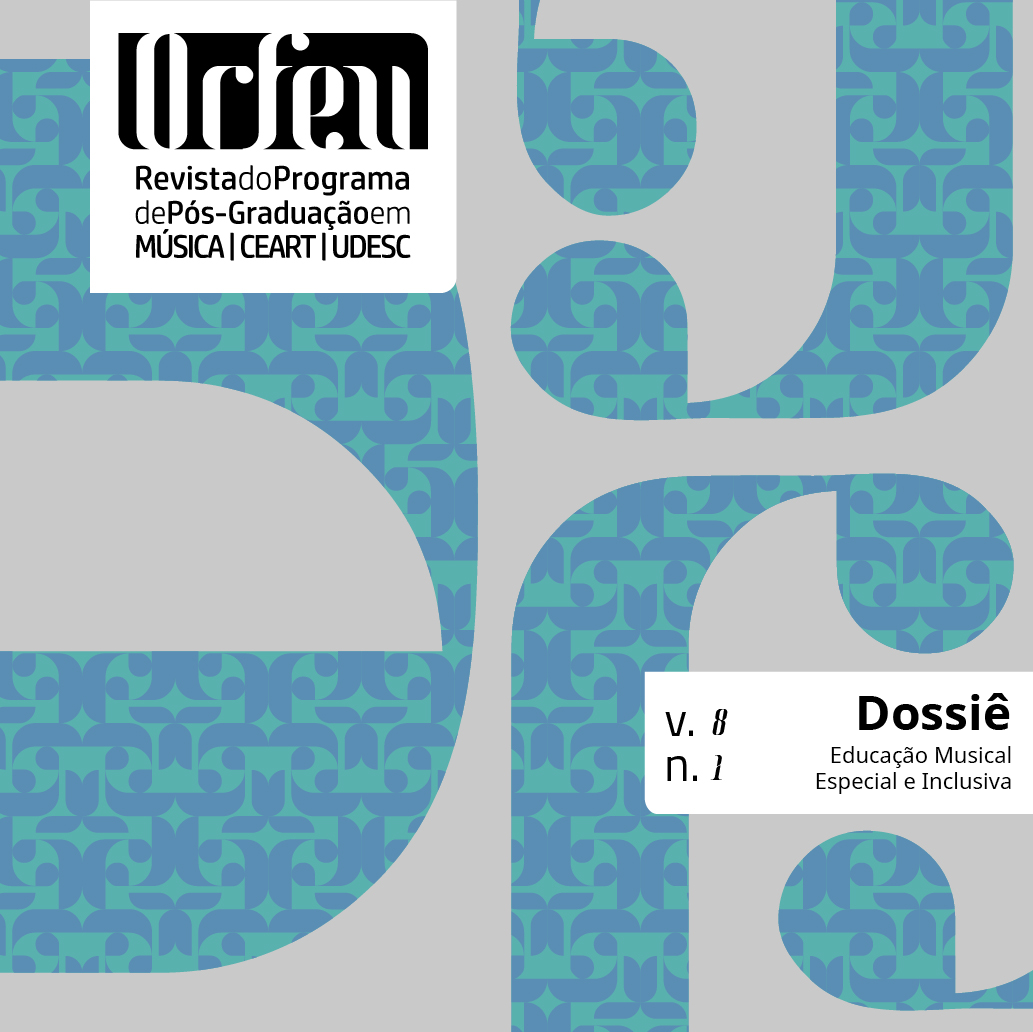Deficiência e capacitismo: o ensino e a aprendizagem musical a partir de práticas pedagógicas anticapacitistas
DOI:
https://doi.org/10.5965/2525530408022023e0114Palabras clave:
deficiência, capacitismo, ensino e aprendizagem musical, práticas pedagógicas anticapacitistasResumen
Este texto é parte dos estudos de um doutorado em andamento, cuja temática central é a inclusão de estudantes com deficiências e transtornos em contexto de ensino e aprendizagem musical. O objetivo específico deste texto é considerar os modelos de compreensão da deficiência e levantar discussões sobre o capacitismo, entendendo este como uma forma de violência. Para atender a este propósito, o texto foi elaborado na forma de um ensaio, sob o aporte teórico de autoras do campo como Débora Diniz, Marivete Gesser, Isabel Maior e Juliana Segalla. Na seção final, são trazidos alguns exemplos de práticas pedagógicas realizadas por uma das autoras. Conclui-se que para pensar no desenvolvimento de um contexto de ensino e aprendizagem musical com práticas pedagógicas anticapacitistas, é preciso estarmos dispostos a construir uma pedagogia transformadora que esteja alicerçada na flexibilidade, na criatividade, no respeito pela diversidade, na transformação da consciência e no combate às violências cotidianas. Acreditamos que pensar em uma sala de aula de música com práticas pedagógicas anticapacitistas envolve antes de tudo estarmos dispostos a construir uma pedagogia transformadora que esteja alicerçada no respeito pela diversidade.
Descargas
Citas
BRASIL. Decreto Legislativo nº 186, de 09 de julho de 2008. Aprova o texto da Convenção sobre os Direitos das Pessoas com Deficiência e de seu Protocolo Facultativo, assinados em Nova Iorque, em 30 de março de 2007. Brasília, DF: Diário Oficial da União,
Disponível em: http://www.planalto.gov.br/ccivil_03/congresso/dlg/dlg-186-2008.htm. Acesso em: 25 fev. 2022.
BRASIL. Decreto nº 6.949, de 25 de agosto de 2009. Promulga a Convenção Internacional sobre os Direitos das Pessoas com Deficiência e seu Protocolo Facultativo, assinados em Nova York, em 30 de março de 2007. Brasília, DF: Diário Oficial da União, 2009. Disponível em: http://www.planalto.gov.br/ccivil_03/_ato2007-2010/2009/decreto/d6949.htm. Acesso em: 28 jan. 2022.
DINIZ, D. Deficiência e Políticas Sociais: Entrevista com Colin Barnes. SER Social, [S. l.], v. 15, n. 32, p. 237–251, 2013. DOI: 10.26512/ser_social.v15i32.13043. Disponível em: https://periodicos.unb.br/index.php/SER_Social/article/view/13043. Acesso em: 31 jul. 2022.
DINIZ, Débora. O que é deficiência. São Paulo: Brasiliense, 2012.
DINIZ, Débora; WERNER, Andréa. Débora Diniz: os abandonos da maternidade atípica. Os abandonos da maternidade atípica. YouTube, 2020. Disponível em: https://www.youtube.com/watch?v=kFyRWRbZuWk. Acesso em: 03 jul. 2023.
FAGUNDES, Flávia Maiara Lima. Deficiência e capacitismo: reflexões sobre a inclusão na aula de música. Debates, Rio de Janeiro, v. 26, n. 2, p. 121-132, out. 2022.
FANON, Frantz. Pele negra, máscaras brancas. São Paulo: Ubu Editora, 2020. 320 p. Tradução de Sebastião Nascimento e colaboração de Raquel Camargo.
FREIRE, Paulo. Pedagogia do oprimido. Rio de Janeiro: Paz e Terra, 2005. 213 p.
GESSER, Marivete; BLOCK, Pamela; MELLO, Anahí Guedes de. Estudos da deficiência: interseccionalidade, anticapacitismo e emancipação social. In: GESSER, Marivete; BÖCK, Geisa Letícia Kempfer; LOPES, Paula Helena. Estudos da deficiência: anticapacitismo eemancipação social. Curitiba: Crv, 2020. p. 17-35.
GESSER, Marivete. Gênero, deficiência e a produção de vulnerabilidades In: VEIGA, Ana Maria; NICHNIG, Claudia Regina; WOLFF, Cristina Scheibe; ZANDONÁ, Jair. Mundos de mulheres no Brasil. Curitiba: Crv, 2019. p. 353-361. Disponível em: https://repositorio.ufsc.br/bitstream/handle/123456789/193579/Mundos%20de%20Mulheres%20no%20Brasil%20-20versao%20final.pdf?sequence=4&isAllowed=y. Acesso em: 22 fev. 2022.
hooks, bell. Ensinando a transgredir: a educação como prática da liberdade. 2. ed. São Paulo: Editora Wmf Martins Fontes, 2017. 283 p. Tradução de Marcelo Brandão Cipolla.
hooks, bell. Ensinando comunidade: uma pedagogia da esperança. São Paulo: Elefante, 2021. 296 p. Tradução Kenia Cardoso.
IBGE. Pessoas com deficiência e as desigualdades sociais no Brasil IBGE. Estudos e Pesquisas. Informação Demográfica e Socioeconômica, n. 47. Coordenação de População e Indicadores Sociais. Rio de Janeiro, 2022. Disponível em: https://
biblioteca.ibge.gov.br/index.php/biblioteca-catalogo?view=detalhes&id=2101964. Acesso em 02 jul 2023.
MAIOR, Izabel Maria Madeira de Loureiro. Movimento político das pessoas com deficiência: reflexões sobre a conquista de direitos. Inclusão Social, Brasília, DF, v. 10, n. 2, p. 28-36, jan./jun. 2017. Disponível em: http://revista.ibict.br/inclusao/article/view/4029. Acesso em: 24 fev. 2022.
MELLO, Anahi Guedes. Deficiência, incapacidade e vulnerabilidade: do capacitismo ou a preeminência capacitista e biomédica do Comitê de Ética em Pesquisa da UFSC. Ciência & Saúde Coletiva, Rio de Janeiro, v. 21, n. 10, p. 3265-3276, 2016. Disponível em:
https://www.redalyc.org/articulo.oa?id=63047756029. Acesso em: 01 fev. 2022.
PAIVA, Juliana Cavalcante Marinho; SILVEIRA, Thaís Becker Henriques; LUZ, Joseane de Oliveira. Dinâmicas da participação política e estudos da deficiência: representatividade e políticas públicas In: GESSER, Marivete; BÖCK, Geisa Letícia Kempfer; LOPES, Paula Helena. Estudos da deficiência: anticapacitismo e emancipação social. Curitiba: Crv, 2020. p. 95-111.
PROVÍNCIA DO RIO DE JANEIRO. Lei nº 1, de 1837, e o Decreto nº 15, de 1839. Dispõe sobre instrução primária no Rio de Janeiro. [S. l.], 1837 e 1839. Disponível em: https://seer.ufrgs.br/asphe/article/viewFile/29135/pdf. Acesso em 02 jul. 2023.
SEGALLA, Juliana Izar Soares da Fonseca. Inclusão não é favor nem bondade. São Paulo: Matrioska, 2021.
Descargas
Publicado
Cómo citar
Número
Sección
Licencia
Derechos de autor 2023 Flávia Fagundes, Silvia Sobreira

Esta obra está bajo una licencia internacional Creative Commons Atribución 4.0.






